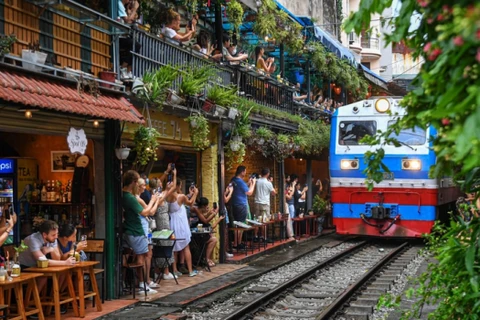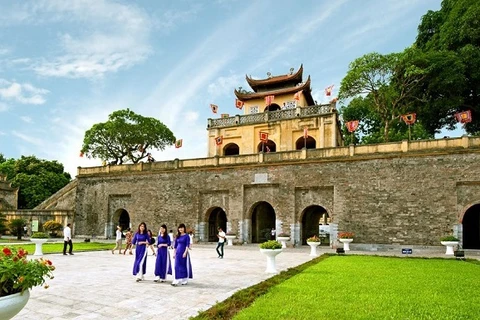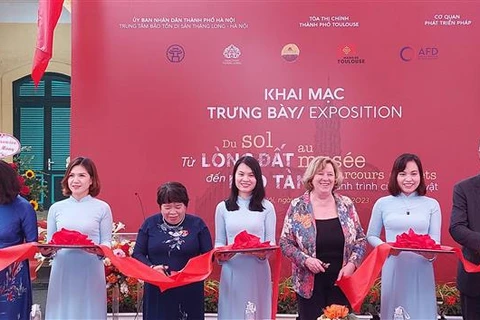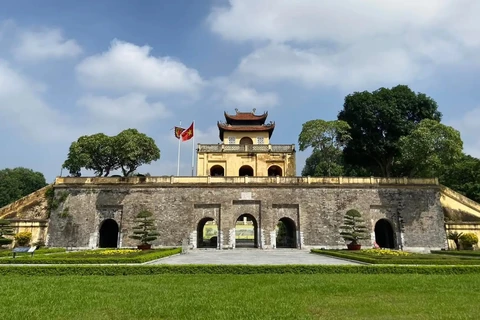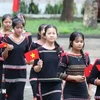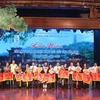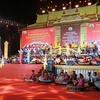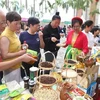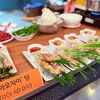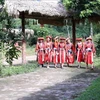 More than 300 delegates attending the 12th Vietnam-France decentralisation cooperation conference experienced a night tour to explore the Thang Long Imperial Citadel on the night of April 15. (Photo: VNA)
More than 300 delegates attending the 12th Vietnam-France decentralisation cooperation conference experienced a night tour to explore the Thang Long Imperial Citadel on the night of April 15. (Photo: VNA) Hanoi (VNA) – The capital city of Hanoi has spared no expense in renovating and promoting its heritage sites while seeking new ways for sustainable preservation.
Hanoi is home to more than 1,200 recognised relic sites, accounting for one-third of this type of valuable site nationally.
It can be said that Hanoi preserves a huge amount of cultural heritage for the country, Deputy Minister of Culture, Sports and Tourism Hoang Dao Cuong said at a meeting held on April 18, aiming to review the implementation of a project on the preservation of Thang Long Imperial Citadel and the Co Loa relic site, and setting key tasks for 2023.
The Ministry of Culture, Sports and Tourism (MoCST) recognised Hanoi’s investment in the restoration of relics, especially according to a resolution of the city’s Party Committee on spending more than 4 trillion VND (170 million USD) on 500 sites, he said, noting that it will contribute to preserving cultural heritages of the nation.
Over the recent years, the relics under the management of the department have been well restored and preserved to promote their values, according to Hanoi’s Department of Culture and Sports. As a result, since 2015, the Thang Long Imperial Citadel, the Temple of Literature and Hoa Lo Prison - the key sites of the city - have welcomed millions of domestic and foreign visitors each year.
Nguyen Thanh Quang, director of the Thang Long – Hanoi Heritage Conservation Centre, said as of April 15, 250,640 tourists had visited Thang Long Imperial Citadel and 135,379 toured Co Loa relic site. Revenue from fees and charges reached 5.62 billion VND, which equals 80% of the assigned plan. Especially, more than 300 delegates attending the 12th Vietnam-France decentralisation cooperation conference experienced a night tour to explore the Thang Long Imperial Citadel which was recognised by UNESCO as a World Heritage Site in 2010 - on the night of April 15.
Regarding Kinh Thien Palace – the most important building in the citadel, Hanoi has sought recommendations from international experts to preserve the relic.
The municipal People’s Council has issued resolutions relating to the approval or adjusting investment policies for a number of projects using the city’s public investment capital. Some examples are the conservation project of the archaeological site at 18 Hoang Dieu Street; upgrading of An Duong Vuong Temple and Ngoc Well; upgrading of Co Loa Communal House or Ngu Trieu Di Quy and My Chau Temple; and a project on building a temple dedicated to King Ngo Quyen.
Hanoi is mobilising all resources to protect and promote the values of the city's intangible cultural heritage under a plan until 2025.
The municipal Department of Culture and Sports is tasked with closely coordinating with relevant agencies, local authorities and communities in deploying solutions to protect the heritages. Dissemination campaigns will be launched to introduce the intangible heritage value to both Vietnamese and international visitors, contributing to enhancing the community awareness of the work.
The city will compile scientific dossiers for several local intangible cultural heritages to submit to the MoCST seeking inscription of them on the list of national intangible cultural heritage, as well as develop publications on the heritages. Training courses will be organised to improve the practice or performance skills for typical intangible cultural performances that are on the verge of disappearing.
Favourable policies will be issued for artists along with the restoration of various types of intangible cultural heritage. The city will encourage and facilitate the collection and introduction of these heritages by both organisations and individuals.
The city will promote socialisation of resources to preserve and promote their value by attracting the attention and support of organisations, individuals, and businesses in the field.
With 1,793 intangible cultural heritages, including three UNESCO-recognised Intangible Cultural Heritages of Humanity, the capital city is one of the communities with the richest traditions in Vietnam./.
